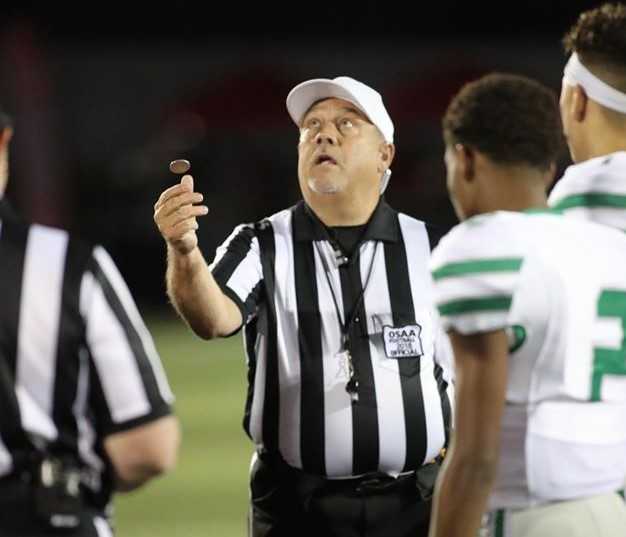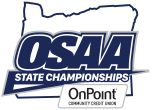
As the long-awaited Season 2 debuts with traditional fall sports this week, Oregon high school athletic departments have been thrown yet another curve.
Preliminary registrations for game officials are “lagging way behind last year,” according to Jack Folliard, executive director of the Oregon Athletic Officials Association. The shortage has complicated the scheduling process.
“The anecdotal feedback I'm getting from the commissioners is that they're really worried about being able to cover all the contests,” Folliard said. “But they're working with the schools to do scheduling moves, etc., to be able to get more availability of officials.”
Nationwide, registrations for high school sports officials are down about 20 percent from 2019-20. Oregon is experiencing an even bigger decline as football (656 to 443, 33 percent), volleyball (425 to 233, 45 percent) and soccer (454 to 324, 29 percent) registrations are down substantially.
“There are going to be some issues,” OSAA assistant executive director Brad Garrett said. “We're asking our schools to be patient.”
Considering that the median age for football officials in Oregon is 46, many of them are in a higher risk category for COVID-19.
“There are a lot of officials that are up in years and are concerned about officiating because of COVID,” Folliard said. “I know we're losing officials because of COVID. It probably affects recruiting for the same reason.”
Under the state vaccination plan, high school officials have been prioritized along with school personnel. It is unclear, though, how many of them have been vaccinated.
Health concerns is just one issue that could be keeping officials from registering. The truncated season cuts into potential income, and the lack of playoffs and state championships eliminates another motivating factor.
“That's a kind of carrot oftentimes for officials,” Garrett said. “Add the factors, and it starts compounding our situation.”
The lack of officials puts schools in a bind. To accommodate the situation, schools may be forced to stack their varsity and subvarsity contests, or even reschedule them. And then there's the possibility of schools having to reshuffle contests due to positive COVID-19 tests.
“We're going to see some creative scheduling coming up,” Garrett said. “It's possible that in some areas of the state, on some days, games can't be played if they aren't willing to move them. That's going to force our athletic directors and commissioners to be more flexible than they are have been if we're going to get this done.”
That means football won't necessarily be a Friday thing. For example, the Portland Football Officials Association – the state's largest – might only have enough officials to do about 25 games on a Friday night.
“It's going to force people to go on Thursday and potentially Saturday,” Garrett said. “You're going to probably see some games Thusday, Friday, Saturday and Monday.”
Eight 6A games are scheduled for Saturday. West Salem originally was scheduled to play host to Silverton on Friday, using Portland officials because the Salem association was shorthanded. But when a handful of Portland-area schools opted in late, West Salem-Silverton lost its Portland crew and had to switch to Saturday.
In an effort to spread officials, Garrett said the OSAA is granting exemptions for associations to work with four-man crews, rather than the usual five. The state has used five-man crews for more than a decade.
Doing back-to-back football games is challenging for officials, but it's a likely option for volleyball and soccer as schools line up consecutive varsity and subvarsity contests.
“The same crew could work all of them,” Folliard said. “Any time we can just have one venue, and consecutive contests, that helps us.”
The officials who have signed up will carry a heavier workload as schools organize their schedules to fit their availability. Folliard is hoping that, in that scenario, the earning potential will be an incentive for some officials.
“That could be good,” Folliard said. “Officials aren't really in it for the money, but it always helps to make a few extra bucks. That might help us get some folks to sign back up.”
Folliard said the uncertainty of high school sports in 2020-21 has been detrimental to recruiting officials, especially for football.
“It's really not football season,” Folliard said. “We think of football in the fall, and here it is March. So I don't know psychologically if that would matter.”
The first week or two of the season will be revealing for schools and officials as they seek a balance. The shrinking number of officials could be countered by fewer contests due to lower participation.
“There are a bunch of schools who are struggling because of numbers,” Garrett said. “We're allowing certain cooperatives to take place that never would happen if we were in a normal year. Because this year, leagues and classifications mean nothing for the next six weeks.”
Folliard said that officiating commissioners feel pressure to fill the contests to allow students to play. They will do whatever they can to have enough officials to make it happen.
“We don't have a playbook. Nobody's ever gone through this before,” Folliard said. “I've talked with a lot of athletic directors, and the OSAA, and they understand that everybody's in this together. Everybody is on the same page trying to make this work, and flexibility is the name of the game.”
***
Interested in becoming an official? You can get connected at newofficials.org









